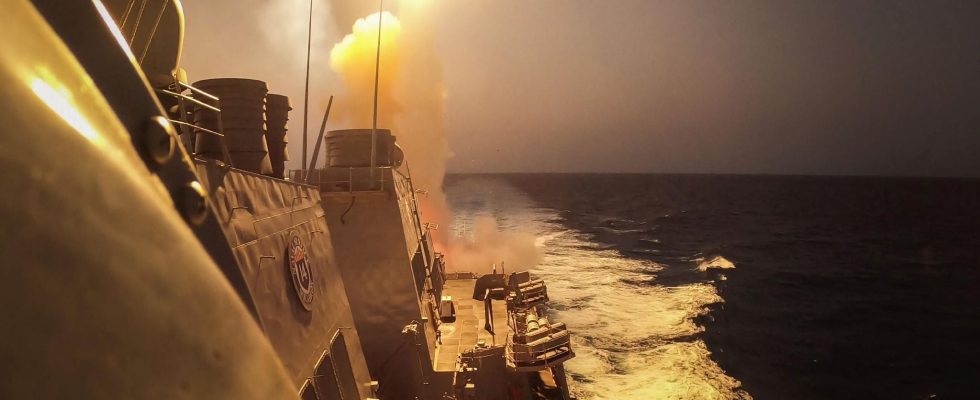Tensions are rising again in the Red Sea. The United States and the United Kingdom carried out airstrikes overnight from Thursday to Friday on Yemen’s capital Sanaa and other rebel-controlled cities in the country.
This group, a member of the “axis of resistance”, a grouping of movements hostile to Israel established by Iran which also includes Palestinian Hamas and Lebanese Hezbollah, has for weeks been increasing attacks against maritime traffic in the Red Sea in ” solidarity” with the Palestinians of Gaza.
What happened ?
The strikes targeted military sites in Sanaa and the governorates of Hodeidah, Taiz, Hajjah and Saada, said Houthi military spokesperson Yahya Saree. Five people were killed and six injured among the rebels, he added, counting “73 raids” by the “American-British enemy”. “Our country is facing a massive attack by American and British ships, submarines and aircraft,” Houthi Deputy Foreign Minister Hussein Al-Ezzi was quoted as saying by rebel media.
These American and British strikes against the Houthis targeted radars and drone and missile infrastructure, in order to reduce their abilities to attack merchant ships in the Red Sea, said American Defense Minister Lloyd Austin.
A spokesperson for the rebels in Yemen, Mohamed Abdel Salam, said this Friday that the Houthis will continue to target ships linked to Israel in the Red Sea, denouncing “unjustified” American-British strikes against his movement. “There is no justification for this aggression against Yemen, since there was no threat to international shipping in the Red Sea […]and the target was and will remain Israeli ships or those heading towards the ports of occupied Palestine,” he wrote on X (formerly Twitter).
Why did this operation take place?
“This operation is intended to disrupt and degrade the Houthis’ ability to endanger sailors and threaten international commerce in one of the world’s most important maritime passages,” the Pentagon chief said in a statement. . The operation was carried out “successfully” in “direct response to the unprecedented attacks by the Houthis on international ships in the Red Sea”, also affirmed the American President, Joe Biden, referring to a “defensive” action to protect international trade in particular. . He warned, in a statement, that he “would not hesitate” to “order further measures” if necessary.
“Our objective remains the de-escalation of tensions and the restoration of stability in the Red Sea,” underlines a joint statement involving the United States, Australia, Bahrain, Canada, Denmark, Germany, Netherlands, New Zealand, South Korea and the Kingdom -United. “Today’s actions demonstrate a shared commitment to freedom of navigation, international trade and the defense of seafarers’ lives in the face of illegal and unjustifiable attacks,” the governments of the 10 countries said.
Shortly after the start of the war on October 7 between Israel and Hamas, the Houthi rebels increased missile and drone attacks in the Red Sea, pushing many shipowners to bypass the area, at the cost of increasing costs and transport time between Europe and Asia. In detail, the Houthis, close to Iran and who control a large part of Yemen, have carried out, since November 19, 27 missile and drone attacks near the strategic Bab el-Mandeb strait separating the Arabian peninsula from the Africa, according to the US military. They say they target commercial vessels linked to Israel. The United States had already deployed warships and set up an international coalition in December to protect maritime traffic in this area through which 12% of world trade passes.
What are the international reactions?
Russia condemned an operation leading to “escalation” and having “destructive objectives”, a “new example of the distortion by the Anglo-Saxons of UN Security Council resolutions and total disregard for the international law”. For its part, China said it was “concerned” by the escalation of tensions in the Red Sea, urging “the parties concerned to remain calm and exercise restraint in order to avoid an expansion of the conflict”, declared a Chinese Foreign Ministry spokesperson Mao Ning.
Saudi Arabia said on Friday it was following developments in neighboring Yemen with “concern”. The kingdom “follows with great concern the military operations in the Red Sea and the airstrikes on a number of sites” in Yemen, the Saudi Foreign Ministry said in a statement, calling “for restraint and to avoid climbing”.
The American-British strikes in Yemen will have “repercussions on regional security”, the Palestinian Islamist movement Hamas warned this Friday in a statement published on its Telegram channel. “We strongly condemn the blatant US-British aggression on Yemen. We hold them responsible for the repercussions on regional security,” Hamas warned.
The Houthis bear “the extremely heavy responsibility for the regional escalation”, France said on the contrary. Paris, which has deployed a frigate in the area, “demands that the Houthis immediately end” their attacks and recalls that States have “the right” to react, according to a press release from its Ministry of Foreign Affairs. Paris “will continue to assume its responsibilities and contribute to maritime security in this area in conjunction with its partners”, adds the Quai d’Orsay, recalling that the frigate Languedoc had destroyed drones in the area in December.
The United Kingdom, for its part, considered that the strikes launched were “limited, necessary and proportionate”, declared British Prime Minister Rishi Sunak. “Despite repeated warnings from the international community, the Houthis have continued to carry out attacks in the Red Sea, again this week against British and American warships. This cannot continue. […] We therefore took limited, necessary and proportionate measures in self-defence,” he said in a statement.
